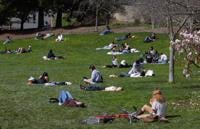UC Berkeley remains the nation’s top public university, according to this year’s Academic Ranking of World Universities, or ARWU. The ARWU also named UC Berkeley the fifth-best university in the world, behind Harvard University, Stanford University, the University of Cambridge and Massachusetts Institute of Technology. UC Berkeley ranked fifth overall last year, which was its lowest rank since the ARWU was first published in 2003. The ARWU placed two other UC campuses in the top 20 — UCLA at No. 11 and UC San Diego at No. 15. “The AWRU rankings reaffirm what we know: That Berkeley is the top public university in the country, as well as neck-and-neck with the very best private institutions anywhere,” campus spokesperson Michael Dirda said in an email. “We try not get overly excited or worked up about minor fluctuations from year to year. ... Doing so would give credence to false short-term narratives about our getting better or worse.” Dirda noted that campus administration does not make decisions with the sole aim of scoring better on rankings such as ARWU. He added that the recognition that rankings can inspire broadly benefits the campus by attracting stronger applicants and encouraging support from donors, elected officials and the public. More than a dozen departments at UC Berkeley placed in the top five in their subject, including physics and statistics, which all ranked second, while electrical engineering, biotechnology and economics all ranked third. The UC Berkeley Department of Chemistry was named the best in the world. Matthew Francis, chair of the department of chemistry, said rankings such as the ARWU help with fundraising and attracting the world’s best scholars. He said he was proud of the students and faculty in his department and happy that their values resonated with AWRU’s metric, but said rankings had little bearing on decisions made within the department. “The rankings themselves are not a priority,” Francis said. “We prioritize the education of our students, the quality of the program and doing what we think is right in terms of advancing chemistry and the social consciousness around our field.” The ARWU uses six objective indicators, separated into four categories — quality of education, quality of faculty, research output and “per capita performance” — to make its distinction. Indicators include the number of alumni and staff of an institution winning Nobel Prizes and Fields Medals and the number of papers published in the journals Scienceand Nature. Campus freshman Manav Rathod said rankings such as ARWU’s helped him compare schools during the college admissions process but hold less value now that he is on campus. “Those rankings only mean so much,” Rathod said. “What you do here I think matters a lot more. I’m not going to succeed just because I’m at Cal.”
UC Berkeley named No. 1 public university
- By Sam Levin
- Comments
Tags
comments powered by Disqus











